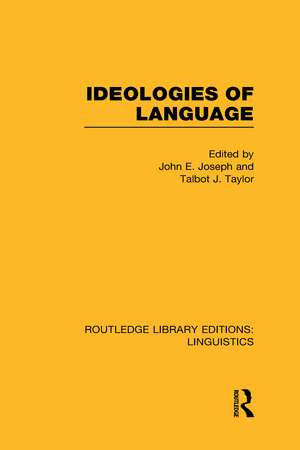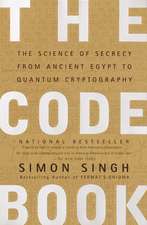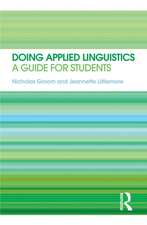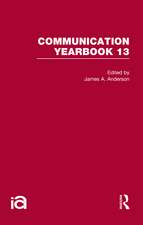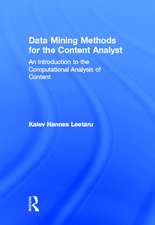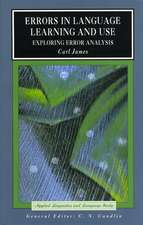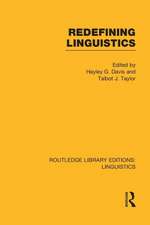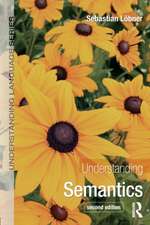Ideologies of Language (RLE Linguistics A: General Linguistics): Routledge Library Editions: Linguistics
Editat de John E. Joseph, Talbot J. Tayloren Limba Engleză Hardback – 21 noi 2013
One of the most cherished assumptions of modern academic linguistics is that the study of language is, or should be, ideologically neutral. This professed ideological neutrality goes hand-in-hand with claims of scientific objectivity and explanatory autonomy. Ideologies of Language counters these claims and assumptions by demonstrating not only their descriptive inaccuracy but also their conceptual incoherence.
| Toate formatele și edițiile | Preț | Express |
|---|---|---|
| Paperback (1) | 416.22 lei 6-8 săpt. | |
| Taylor & Francis – 21 dec 2015 | 416.22 lei 6-8 săpt. | |
| Hardback (1) | 1001.84 lei 6-8 săpt. | |
| Taylor & Francis – 21 noi 2013 | 1001.84 lei 6-8 săpt. |
Din seria Routledge Library Editions: Linguistics
-
 Preț: 340.60 lei
Preț: 340.60 lei - 18%
 Preț: 1000.27 lei
Preț: 1000.27 lei - 18%
 Preț: 1002.63 lei
Preț: 1002.63 lei - 15%
 Preț: 671.56 lei
Preț: 671.56 lei - 18%
 Preț: 1002.63 lei
Preț: 1002.63 lei - 18%
 Preț: 1002.63 lei
Preț: 1002.63 lei - 18%
 Preț: 999.46 lei
Preț: 999.46 lei - 18%
 Preț: 777.70 lei
Preț: 777.70 lei - 34%
 Preț: 4327.12 lei
Preț: 4327.12 lei - 18%
 Preț: 1003.43 lei
Preț: 1003.43 lei - 15%
 Preț: 636.01 lei
Preț: 636.01 lei - 18%
 Preț: 1000.27 lei
Preț: 1000.27 lei - 34%
 Preț: 4048.76 lei
Preț: 4048.76 lei - 18%
 Preț: 1061.06 lei
Preț: 1061.06 lei - 18%
 Preț: 1061.81 lei
Preț: 1061.81 lei - 18%
 Preț: 781.64 lei
Preț: 781.64 lei - 18%
 Preț: 780.87 lei
Preț: 780.87 lei - 18%
 Preț: 891.85 lei
Preț: 891.85 lei - 18%
 Preț: 1054.71 lei
Preț: 1054.71 lei - 18%
 Preț: 1001.84 lei
Preț: 1001.84 lei - 18%
 Preț: 1343.56 lei
Preț: 1343.56 lei - 18%
 Preț: 781.64 lei
Preț: 781.64 lei - 34%
 Preț: 5440.48 lei
Preț: 5440.48 lei - 18%
 Preț: 1002.80 lei
Preț: 1002.80 lei - 15%
 Preț: 670.77 lei
Preț: 670.77 lei - 18%
 Preț: 1001.84 lei
Preț: 1001.84 lei - 34%
 Preț: 2378.63 lei
Preț: 2378.63 lei - 18%
 Preț: 1060.25 lei
Preț: 1060.25 lei - 18%
 Preț: 1005.01 lei
Preț: 1005.01 lei - 18%
 Preț: 1000.27 lei
Preț: 1000.27 lei - 34%
 Preț: 1821.92 lei
Preț: 1821.92 lei - 18%
 Preț: 1002.63 lei
Preț: 1002.63 lei - 18%
 Preț: 1282.82 lei
Preț: 1282.82 lei - 18%
 Preț: 1062.62 lei
Preț: 1062.62 lei - 18%
 Preț: 1059.45 lei
Preț: 1059.45 lei - 18%
 Preț: 780.87 lei
Preț: 780.87 lei - 18%
 Preț: 1058.69 lei
Preț: 1058.69 lei - 18%
 Preț: 1001.07 lei
Preț: 1001.07 lei -
 Preț: 330.87 lei
Preț: 330.87 lei - 18%
 Preț: 1168.37 lei
Preț: 1168.37 lei - 18%
 Preț: 1060.25 lei
Preț: 1060.25 lei - 18%
 Preț: 1000.27 lei
Preț: 1000.27 lei - 18%
 Preț: 999.46 lei
Preț: 999.46 lei - 18%
 Preț: 1285.98 lei
Preț: 1285.98 lei - 15%
 Preț: 671.56 lei
Preț: 671.56 lei - 18%
 Preț: 1956.17 lei
Preț: 1956.17 lei - 34%
 Preț: 1293.09 lei
Preț: 1293.09 lei
Preț: 1001.84 lei
Preț vechi: 1221.75 lei
-18% Nou
Puncte Express: 1503
Preț estimativ în valută:
191.70€ • 200.69$ • 158.62£
191.70€ • 200.69$ • 158.62£
Carte tipărită la comandă
Livrare economică 05-19 aprilie
Preluare comenzi: 021 569.72.76
Specificații
ISBN-13: 9780415715782
ISBN-10: 0415715784
Pagini: 256
Dimensiuni: 156 x 234 x 16 mm
Greutate: 0.5 kg
Ediția:New.
Editura: Taylor & Francis
Colecția Routledge
Seria Routledge Library Editions: Linguistics
Locul publicării:Oxford, United Kingdom
ISBN-10: 0415715784
Pagini: 256
Dimensiuni: 156 x 234 x 16 mm
Greutate: 0.5 kg
Ediția:New.
Editura: Taylor & Francis
Colecția Routledge
Seria Routledge Library Editions: Linguistics
Locul publicării:Oxford, United Kingdom
Cuprins
Introduction, John E. Joseph, Talbot J. Taylor; Part 1 Linguistic Ideologies; Chapter 1 Which is to be master? The institutionalization of authority in the science of language, Talbot J. Taylor; Chapter 2 That obscure object of desire: a science of language, Tony Crowley; Chapter 3 Ideologizing Saussure: Bloomfield’s and Chomsky’s readings of the Cours de linguistique générale, John E. Joseph; Chapter 4 Demythologizing sociolinguistics: why language does not reflect society, Deborah Cameron; Part 2 The Linguistics of Self-Image; Chapter 5 Celso Cittadini and the origin of the vernacular: the convergence of science and subjectivity, Michael T. Ward; Chapter 6 Ideology and the ‘clarity’ of French, Pierre Swiggers; Chapter 7 The ideological profile of Afrikaans historical linguistics, Paul T. Roberge; Part 3 Political Linguistics; Chapter 8 On freedom of speech, Roy Harris; Chapter 9 What are words worth? Language and ideology in French dictionaries of the revolutionary period, Pieter Desmet, Johan Rooryck, Pierre Swiggers; Chapter 10 ‘Reducing’ Pacific languages to writings, Peter Mühlhäusler; Chapter 11 Theory of emergence: towards a historical-materialistic approach to the history of linguistics, Paul Laurendeau;
Notă biografică
John E. Joseph, Talbot J. Taylor
Descriere
Is the study of language ideologically neutral? If so, is this study objective and autonomous? One of the most cherished assumptions of modern academic linguistics is that the study of language is, or should be, ideologically neutral. This professed ideological neutrality goes hand-in-hand with claims of scientific objectivity and explanatory autonomy. Ideologies of Language counters these claims and assumptions by demonstrating not only their descriptive inaccuracy but also their conceptual incoherence.
